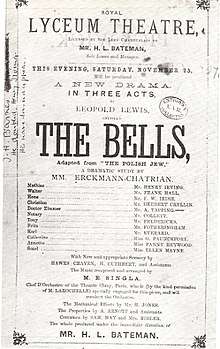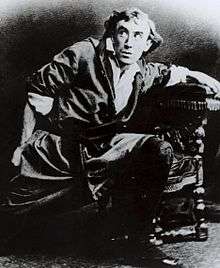1871 in literature
This article contains information about the literary events and publications of 1871.
| |||
|---|---|---|---|
|
Events

Programme for the opening night of The Bells

Henry Irving as Mathias in The Bells
- January 1 – The children's literary magazine Young Folks begins publication in the United Kingdom as Our Young Folks' Weekly Budget.
- January – John Ruskin begins publishing Fors Clavigera, his originally monthly "letters to the workmen and labourers of Great Britain".
- March 18–May 28 – The Paris Commune is influential on the literary figures in the city at the time and far beyond:
- Jules Vallès publishes his newspaper Le Cri du Peuple February 22–May 23 (with interruptions).
- At the beginning of April, Victor Hugo moves to Brussels to take care of the family of his son, who has just died, but closely follows events in Paris, on April 21 publishing the poem "Pas de représailles" (No reprisals) and on June 11 writing the poem "Sur une barricade" (On the barricade).
- Émile Zola, as a journalist for Le Sémaphore de Marseille, reports the fall of the Commune, and is one of the first reporters to enter the city during Semaine sanglante (Bloody Week, beginning May 21).
- October – "Thomas Maitland", i. e. Robert Williams Buchanan, attacks Dante Gabriel Rossetti and other members of what Buchanan calls the "Fleshly School" of English poetry in The Contemporary Review. On December 16 Rossetti replies in "The Stealthy School of Criticism" in the Athenaeum.
- November 25 – First performance of The Bells starring Henry Irving at the Lyceum Theatre, London,[1] the actor's first great success. On the same night, he breaks up permanently with his wife when she criticises his choice of profession.
- December – Publication of George Eliot's novel Middlemarch in eight parts commences.
- George Allen and Sons, publishers, predecessors of Allen & Unwin, established in London.
New books
Fiction
- William Black – A Daughter of Heth[2]
- Mary Elizabeth Braddon – Fenton's Quest
- George Eliot – Middlemarch (first of eight installments)
- Edward Bulwer-Lytton – The Coming Race
- Vanchinbalyn Injinash – The Blue Chronicle (köke sudur, Хөх судар; completed in MS)
- Henry James – Watch and Ward
- George Meredith – The Adventures of Harry Richmond
- William Gifford Palgrave – Personal Narrative of a Year’s Journey through Central and Eastern Arabia (1862–63)[3]
- Emily Spender – Restored (feminist novel)
- Mark Twain
- Eye Openers
- Screamers
- Giovanni Verga – Storia di una capinera (The Sparrow; book publication)
- Jules Verne – A Floating City
- Émile Zola – La Fortune des Rougon
Children and young people
- Alexander Afanasyev (collected) – «Русские детские сказки» (Russian Children's Fairy Tales)
- Louisa M. Alcott – Little Men
- Lewis Carroll – Through the Looking-Glass and What Alice Found There
- George MacDonald – At the Back of the North Wind
- Samuel Smiles – A Boy's Voyage Round the World
- Johanna Spyri – Ein Blatt auf Vrony’s Grab (A Note on Vrony's Grave)
Drama
- François Coppée
- Fais ce que Dois
- L'Abandonnée
- W. S. Gilbert – Pygmalion and Galatea
- Leopold David Lewis – The Bells (adapted from Erckmann-Chatrian's Le Juif Polonais)
- Alexander Ostrovsky – The Forest (Russian: Лес, Les)
- Dobri Voynikov – The Phoney Civilization (Bulgarian: Криворазбраната цивилизация, Krivorazbranata tsivilizatsiya)
Non-fiction
- Charles Darwin – The Descent of Man, and Selection in Relation to Sex
- Edward Burnett Tylor – Primitive Culture
Births
- January 17 – Nicolae Iorga, Romanian historian, politician, culture critic, poet and playwright (died 1940)
- February 22 – John Langalibalele Dube, Zulu writer (died 1946)
- February 25 (February 13 OS) – Lesya Ukrainka, Ukrainian poet and writer (died 1913)
- March 5 – Rosa Luxemburg, Polish-born German revolutionary socialist (died 1919)
- March 27 – Heinrich Mann, German narrator, dramatist and essayist (died 1950)
- June 17 – James Weldon Johnson, American writer and activist (died 1938)
- May 14 – Caton Theodorian, Romanian dramatist and novelist (died 1939)
- July 3 – W. H. Davies, Welsh poet (died 1940)
- July 10 – Marcel Proust, French novelist (died 1922)
- August 21 (August 9 OS) – Leonid Andreyev, Russian short story writer and playwright (died 1919)
- August 27 – Theodore Dreiser, American novelist (died 1945)
- September 27 – Grazia Deledda, Italian writer and Nobel Prize winner (died 1926)[4]
- October 7 – Georg Hermann, German fiction writer (died 1943)
- October 10 – Wickham Steed, English journalist, editor and historian (died 1956)
- October 30 – Paul Valéry, French poet (died 1945)
- November 1 – Stephen Crane, American novelist (died 1900)
- November 10 – Winston Churchill, American novelist (died 1947)
Deaths
- January 12 – Auguste Anicet-Bourgeois, French dramatist (born 1806)
- February 4 – Hermann, Fürst von Pückler-Muskau, German travel and gardening writer (born 1785)
- February 12 – Alice Cary, American poet (tuberculosis, born 1820)[5]
- March 17 – Robert Chambers, Scottish writer and publisher (born 1802)
- March 28 – Joseph Isidore Samson, French playwright and actor (born 1793)
- July 31 – Phoebe Cary, American poet (born 1824)
- July 15 – Ján Chalupka, Slovak dramatist (born 1791)
- December 8 – Thomas Gaspey, English novelist and journalist (born 1788)
gollark: I do not believe there is a way for computers to detect sounds.
gollark: You probably *can't* run it in practical-CC, given limited RAM.
gollark: Well, you can't.
gollark: Unless you hook it up to a giant monitor to display that output, but you'd still be limited by palette.
gollark: Not really, no.
References
- Rowell, George, ed. (1953). Nineteenth Century Plays. World's Classics. Oxford University Press.
- Leavis, Q. D. (1965). Fiction and the Reading Public (2nd ed.). London: Chatto & Windus.
- "Personal Narrative of a Year's Journey through Central and Eastern Arabia (1862–63)". World Digital Library. 1871. Retrieved 2013-09-24.
- Antonio Piromalli, Grazia Deledda, Firenze, La Nuova Italia, 1968.
- Kane, Paul (1995). Poetry of the American Renaissance. New York: George Braziller. p. 297. ISBN 0807613983.
This article is issued from Wikipedia. The text is licensed under Creative Commons - Attribution - Sharealike. Additional terms may apply for the media files.